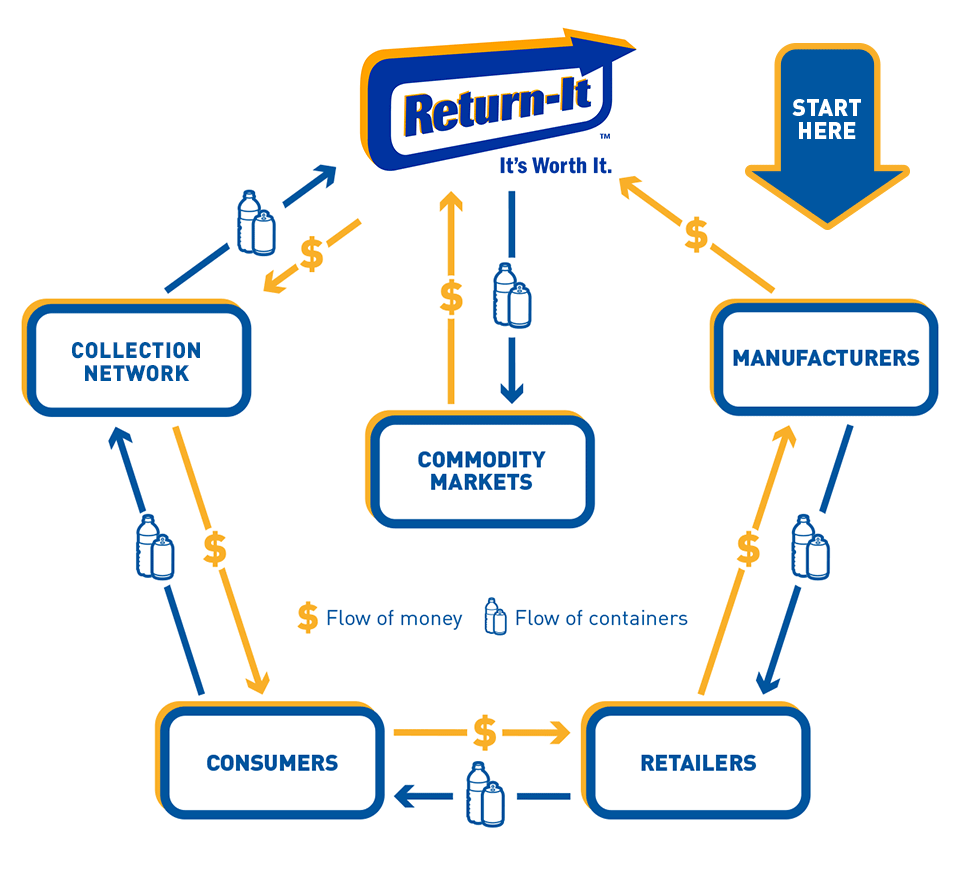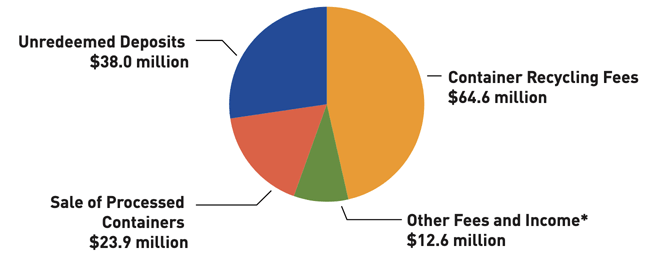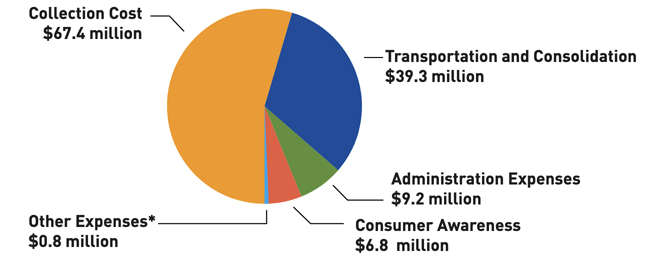07 Plan Performance
7.1 How Money Flows
The arrows show the direction of payments for deposits and container recycling fees (CRFs) and the movement of beverage containers.

7.2 Follow the Money
Consolidated Revenues
Sale of Processed Containers
A portion of the cost of recovering aluminum and plastic containers, the two largest categories, is covered by the value of the commodity collected. Aluminum saw a price decline in late 2023, but by mid-2024 prices had rebounded and, by year-end, surpassed previous-year levels. Plastic experienced a mid-year price boost in 2024 before settling back to 2022 benchmarks by the end of the year.
Unredeemed Deposits
Encorp is paid a deposit for every registered container sold in British Columbia. Unredeemed deposits for those containers not returned by consumers are used to fund the system.
Container Recycling Fees
When the revenue from unredeemed deposits and sales of collected material is insufficient to cover the cost of recovering and recycling a specific container type, a container recycling fee (CRF) is charged on the specific container to make up the shortfall. The CRF is remitted to Encorp upon the distribution and sale of new products in the province. The CRF, which is paid once in the supply chain, is not a tax or a refundable deposit.
Other Fees and Income*
Revenues and income from service provider contracts.

| Container Recycling Fees | $64.6 million | 46.5% |
| Unredeemed Deposits | $38.0 million | 27.3% |
| Sale of Processed Containers | $23.9 million | 17.2% |
| Other Fees and Income* | $12.6 million | 9.1% |
| Total Revenues | $139.1 million | 100% |
*Other Fees includes professional services for Electronic Products Recycling Association (EPRA) and Major Appliance Recycling Roundtable (MARR), interest income and foreign exchange gain/loss.
Consolidated Expenditures
Deposit Refunds
Paid to depots and grocery retailers to reimburse them for the deposits they have refunded to consumers.
Collection Expenditures
Encorp’s single-largest expense is the cost of collection, which includes handling fees paid to contracted Return-It depots that service customers, collect the material and prepare the material for collection by Encorp’s transportation partners.
Transportation and Consolidation
Encorp contracts with various trucking companies to collect containers from depots and grocery retailers and deliver them to contracted consolidation partners, where they are sorted and compacted for shipment to end markets. For these services, Encorp pays them transportation fees, fuel and sorting fees.
Administration
Management of contracts, collection of revenues and payment of expenses.
Consumer Education and Awareness
Programs that encourage consumers to return containers for recycling.

| Collection Cost | $67.4 million | 54.6% |
| Transportation and Consolidation | $39.3 million | 31.8% |
| Administration Expenses | $9.2 million | 7.4% |
| Consumer Awareness | $6.8 million | 5.5% |
| Other Expenses* | $0.8 million | 0.7% |
| Total Expenditures | $123.5 million | 100% |
Note: Calculations may show slight variances due to rounding.
7.3 Container Recycling Fees
CRF stands for container recycling fee. This is the fee Encorp charges to cover the net cost of recycling a beverage container type after any unredeemed deposits and commodity revenues for that container type have been used.
Encorp has developed a cost-effective system to recycle all beverage containers registered with Return-It in accordance with the requirements of the regulation. Obligated beverage containers have a deposit charged at the time of purchase, which is refunded when the empty container is returned to an approved location for the deposit refund. When the revenue from unredeemed deposits and sales of collected material is insufficient to cover the cost of recovering and recycling a specific container type, a container recycling fee (CRF) is charged on the specific container to make up the shortfall.
The CRFs are set annually at a level that covers the costs of administration, collection, transportation and responsible recycling of obligated products covered by the program. CRFs are reviewed annually to ensure that they are no more than is necessary to cover the ongoing cost of operating the program.
*Effective September 1, 2024